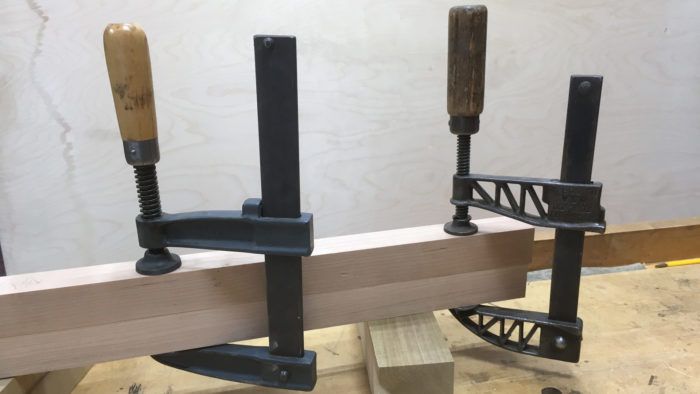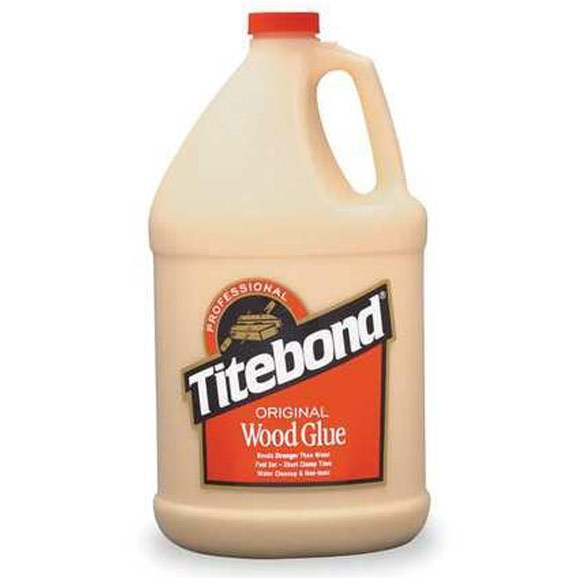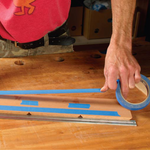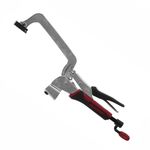Tool Rant: Is that really a clamp?
"In the past year, I have become increasingly frustrated using the clamps that I have in my school. They are mostly F clamps made by a well known manufacturer that we have used hard for 15 years. But now I find tightening and loosening them to be a chore."
I am having an increasingly difficult time answering student’s questions about where to buy tools. Recently, I was showing a Starrett square to a class and someone asked if you could get one at one of the big-box hardware stores. Later we were talking about high-quality table saw blades, and the same question came up: Can you get it at a big-box store? What is it with those places? These stores will come into your town, drive every competing store out of business, and then stock only merchandise that’s made overseas and is usually of such low quality that it can’t actually do the job that it was advertised to do. Every time you buy one of those $6 squares or $20 drills, you further cement the hold they have over us and remove any motivation they may have to offer tools that really work well and can go the distance. The need to have the cheapest product has set the bar so low and has gone on for so long that people don’t even realize just how bad the tools are they are trying to use.
In the past year, I have become increasingly frustrated using the clamps that I have in my school. They are mostly F-clamps made by a well known manufacturer that we have used hard for 15 years. But now I find tightening and loosening them to be a chore. They just don’t turn sweetly. As soon as pressure is applied, the threads start to grind. I realized that the couple of 60- or 70-year-old Hartford clamps and Hargrave clamps that I own were completely different. You tighten them, and they do just that—they get tighter, without having to fight them—and loosening them does not require jerking the clamp back and forth. You just turn the handle—ever so sweetly!
A blacksmith friend of mine gave me an interesting answer one time when I asked him why the old Witherby and Swann chisels were so much better than the usual chisel out there today. His answer was “That Witherby chisel was never a Toyota or a refrigerator!”
I think the biggest problem is that the people making the tools do not have any idea what they are actually supposed to be capable of. What’s the big deal? I turn the clamp handle, and it tightens; so it must be good, right? Try turning those handles (under load) for 20 years and then tell me how it works! If the people making the tools don’t know how they work or what they are supposed to be able to do, then how can they understand the impact on the tool when they cheapen one of its components?
A friend of mine purchased a well-known (and expensive) cast-iron router table top like the one I’ve been using in my school for the past 15 years. The problem is that rather than the perfectly fitting and dead flat steel insert ring that came with mine, it has been replaced with a thin, ill-fitting, and warped piece of plastic. Obviously, whoever decided that was a good thing has never used the tool. My friend turned on the router in his new table and the plastic insert shot out of the table like a Frisbee!
Why do tool company executives allow the accounting and advertising departments to drive design decisions? Because they know nothing about what the tool is supposed to do or just how bad the tool actually is. Their arrogance won’t allow them to try to get information from real woodworkers in order to make them better. I’m not talking about asking someone who might use the tool a few times a year; I’m talking about getting serious input from a number of longtime professionals, people who can tell you the difference between that 70-year-old clamp and the new clamp they are trying to make. In other words, people who have to use these tools every day to make a living.
I think what really says it all is something I heard from one of my students a few months back. The student’s brother was a tool executive for a well-known department store. He told my student that the deciding factor in producing a certain tool was not whether it worked. It was based on how it would look in some guy’s basement when he was trying to impress his brother-in-law!
Thank God for flea markets and eBay!
-Bob Van Dyke runs the Connecticut Valley School of Woodworking and is a frequent author for Fine Woodworking
More from Bob:
- Modifying an inexpensive honing guide
- Tablesaw blades for joinery
- Build your first workbench
- Bob’s author page
Fine Woodworking Recommended Products

Titebond I

3M Blue Tape

Milescraft 4007 6in Bench Clamp























Comments
A few years ago I emailed Lee Valley Veritas with the idea of reengineering and manufacturing the old Stanley 45 I've used for years. It took me several years to somewhat master the old tool, but I thought it would be cool if a real tool company reimagined the Stanley contraption. So, now I see they're going to offer an updated version of the old combination plane. I'll bet it works better than the old one. Hope is not lost! Some folks are paying attention.
Explore & Research "Survivorship bias" junk tools have always existed and they always will exist. The tools that survive through time were just the better tools and the junk tools get dumped & forgoten. The error is to look at the surviving examples and to exclaim "that they do not make them like they used to". As many junk brands that exist today there are quality producers like Altendorf, Felder, Festool, Martin, Lie-Nielsen, Veritas etc etc.
This low quality, planned obsolescence concept, applies to so many of the products in our lives, and it's filling the landfills and harming the planet - support the quality companies, your money is your only real voice. I call the purchasing of cheaper and cheaper crappy goods the race to the bottom and I refuse to participate. Buy the best thing you can afford and take care of it, that's really how the great old tools survived, and how today's best tools will live to be antiques.
I think you hit the nail on the head when you referred to accountants making the decisions. Most companies are not customer focused but profit and shareholder focused it's up to us to decide who we support.
I certainly agree with you and that is why I have long made it a practice of only buying the best tools available. Of course, as you mention, sometimes even significant sums of money won't buy a good quality tool, because nobody is making one in that category. I have to admit, however, that I do partially blame publications like Fine Woodworking for this dilemma. Note that your article refers to "well known" manufacturers, but you don't name them. You are, therefore, allowing any innocent person the ability to fall into the trap of buying substandard or even dangerous tools without warning them. Fine Woodworking and other respected publications have the ability shame manufacturers into doing better, because it is only the bottom line that they respect and loudly trumpeting their failures will impact that bottom line. Afraid of lawsuits? Last time that I checked truth was still a viable defense even in this day. Perhaps even crowd-sourcing money for defense funds is an option. Right now, everyone who buys a dangerous "well known" router table is on you and the other people who complain but don't have the courage to be specific. It is not my intention to be harsh on you in particular, but I have only a limited time left on this earth and am increasingly frustrated with the state its in.
Great discussion and I agree with most of your points but it ignores the fact that there are different levels of need. I would argue that they range from the professional woodworker, who needs high quality tools preferably that last a lifetime, to the weekend hobbiest, who may only use a tool a couple times a year or decade. I would argue that the big box stores and the manufactures that feed them have a different target audience as it relates to this discussion.
The focus here should be about what you started with 'educating the students' in that the quality of the tool can directly effect the quality of the work, that there are sources, deminishing though they may be, for tools that are of a higher quality, and that they are not going to find them at the big box store.
The discussion about cheaply made foreign products is a separate issue because they fill a need, though they may not fill your need. It is on you to understand your requirements and look for tools that will fulfill those requirements. If you expect to find a high quality life long tool at the big box store you need to stop and thInk.
I believe there will always be a niche for manufacturers of durable high quality tools and woodworkers willing to pay for the high quality of those tools, I will go even further to say that those high quality tools will look even better than anything you can get at a big box store on the garage wall even if the guy who owns the garage doesn't really know how to use them. If that helps support an industry that keeps those tools available to those of us that need them, so be it.
This is how free market systems operate and it's been happening for hundreds of years. Large companies often acquire smaller ones (or force them out of business) to gain market share, then push their broaden product lines to their customers. In doing so, they often shore up their balance sheet by making their new items less expensive to make a profit.
At the same time, big HVR's will try to undercut their vendors by sourcing similar tools overseas and selling it under their house brands (Kobalt, Rigid). These tools are often marketed as being comparable quality for less money. Before you know, everyone is selling junk just to be competitive. This happens everywhere, not just in tools. Think appliances, lawn mowers, paint etc.
Eventually, people will smart up about the quality of the products and will search elsewhere for their needs by buying from small boutique businesses.
So what's the answer to garbage clamp dilemma ? Easy. Tell Lie Nielsen and Lee Valley to get into the clamp making business.
concur with dsgoen, Why not identify the maker of your clamps that are wearing out after 15 years? Same with the router table. Having been a subscriber of FWW since the beginning, they tended to ridicule anything but the elite or Cadillac of woodworking tools. They told me 45 years ago the best table saw was the Gold Powermatic, then made by an American company, one that made aircraft landing gear and hydraulic actuators. At that time it sold for about 800-900 dollars. My 1972 Craftsman 10" has gone through at least 4 sets of bearings and maybe 3 motors in 45 years. It was American made then. I still don't have a Powermatic. I do have my Craftsman, as well as Jorgensen pipe clamps and F clamps that are 30 plus years old.. I don't hesitate to buy and ITT bargain bin file set of 3-4 files for a few dollars versus 10 bucks for a Nicholson bastard file that is also made overseas. Buy what you can afford, flea markets and yard sales or great places to buy old high quality brand name tools. With exception of hand tools, the powered tools are going to have arrived in America in a shipping container. Name names so that someone else won't make YOUR mistake...
American Companies went from making a product to making money.
It is cheaper to have a product made overseas and then just ship to distributors, never once is it checked to be sure the quality is there. Of course they do not specify much quality in the first place, after all the Manufacturing Country gets all the blame.
You cannot go to a big box store and get quality tools, period. I know, I've tried them. There are some great tool suppliers like Highland Woodworking and others, so go there if you want a quality tool and a place that can show you how to use it. You can't get that at a big box store, in fact, you are lucky if there is anyone in the store to help other than a cashier. Oh wait, they don't even have cashiers either, its self service.
Valid points and I feel your pain. However, there might be some method to the madness of the corporate executives and accounting types. Unfortunately, we fine woodworking enthusiasts are a tiny niche market. Home centers are built on a model of convenient access to a broad high volume mass market and it's demands. The large majority of contractors and average homeowners don't view tools, especially hand tools, as heirloom investment purchases, rather they are usually looking for the quickest and cheapest way to get the task at hand done. Many contractors see tools as disposable items. So recognizing this, the accounting and corporate types, who owe their duty to their stockholders, may not be as arrogant as you think but might just be making the rational, strategic business decision and listening to the broad market they serve, not the niche market where you and I live.
There are far more budget hotels than luxury hotels. There are far more fast food joints than Michelin starred restaurants. Sometimes we have to pay more and travel further for the quality we seek. That's where purveyors of higher quality tools like Lee Valley, Highland and others come into play, which are going to be less convenient, and probably more expensive than the corner home center for most of us, but if you're a seeker of higher quality tools, you do have options.
It's not just tool quality that slipping. Our six-year-old refrigerator died and we purchased a replacement that will probably only last about the same length of time. The salesperson blamed most of the poor manufacturing these days on EPA regulations. I suggest manufactures are using that as an excuse while they replace metal with plastic and continue to cheapen their products. That said, I have recently purchased a few tools I've coveted for many years and I'm happy to report I am very satisfied with them.
I've tossed out old tools lacking safety devices and other alterations that have really improved them over the years. With luck, at the age of 73, I don't expect to replace very many of my recent tool purchases. However, my late father-in-law predicted each of his last two cars would be his last. Who knows what the future will hold. Maybe a few better, safer, and long-lasting tools?
Yes, one must look elsewhere, great tools are still made but they aren't cheep but boy do they work nice. I know I'm repeating everyone else but it needs repeating. Lie-Nielsen, Veritas, Blue Spruce, etc. Just look, isn't that why you purchased this magazine to find answers?
I don't think there is any other solution than to tell your students to keep trying different brands and stores until they find the right tools that fits what they're looking for. Each person is bound to have different preferences even when it comes to woodworking!
Buy some Festool tools. I haven't owned mine for a long time but using them is a dream. I am assuming they will hold up for quite a while
This story applies across much of US manufacturing. The more we buy made in China, the worse the problem becomes. It is not just the poor quality of tools at the big box store, but those dollars spent there are leaving the American economy, where they are used to buy debt financing US treasury notes which further weaken the US economy. Then we pay interest on that massive debt to the tune of $600 billion per year. So, big box shopper, think that clamp made in China is a good price at $7.99? That’s the most expensive tool you will ever buy! Your grandchildren will still be paying for it!
No point in ranting in the wrong direction. All companies in all countries are doing is meeting the demand of what people want to buy. For every person that can appreciate a tool made to last a lifetime there's 50 who just want an inexpensive tool and have no way to make a realistic judgment on whether or not they will even be using it past the current project. It's the buyers who need to be educated, but then that's the difference between tradesmen (educated professionals) and the average customer. Perhaps the real problem is in thinking one knows what level of quality/price another person "should" be buying, or from forgetting that they had the choice to buy high quality at first, but chose not to. Personally, I try to buy as well-made as possible at a fairly low cost. Using the tool is what educates me about the value of more expensive tools, teaches me what sort of features I want, and allows me to appreciate, and hence, take better care of, the better quality items.
Ask your young students how they buy clothes. Many will say they stick with a brand that shares their values. This strategy works with tools as well. It's all about trust. I have had a look at how Lee Valley is run, its corporate culture, and how they hire people. I'm pretty confident they won't let me down with crappy tools.
Honestly, I have absolutely no problem with the cheap tools as long as it's apparent what they are. Not everyone needs (or can afford) a $200-300 hand plane.
What really bothers me is the ridiculous inflation in prices for imported crap. Cheap tools shouldn't be crap, they used to just be a bare-bones no frills tool. More expensive ones had more thought and were more rugged.
Now a cheap tool is little better than a toy but the same price as what a high quality tool used to be 20yrs ago. The formerly high quality tools now are also mostly made in China with zero QC and are double that.
I'm firmly against the ethos that if it isn't professional, artisan grade it's useless. Lower priced tools have a place for those that can't afford it and I know people that do great work with brands I've always considered crap (even better than what I could do in many cases). But I can't STAND how much they've started charging while simultaneously bottoming out quality across the board after consolidation. Maybe if certain companies stopped spending so much on acquiring competitors, marketing and frivolous design they could actually figure out a way to make a great tool, rather than copying the same model and just lowering quality to hit the price points.
Sad to say, I saw the same thing with shut-off valves. Yes, those valves you rarely have turn, but when you do they better work. Big Box has "BrassCraft" for $14 each, which feature plastic shafts that should be tested every six months. At the local plumbing shop, Dahl for $15 feature brass construction, made in Canada and have 25 year warranty. Which do you want in your house?
AMEN!!!!!
alas, you're overlooking the real reason--economics. The big stores sell dozens of the cheap ones & the high quality ones sit on the shelf for months. They can't afford to keep high quality inventory that moves only occasionally. That's why specialty stores that keep quality tools have to charge a fairly steep markup--because their the sales numbers are slow. Supply & demand determine price, which feeds back on supply & demand
I still get upset when I think of the four hardware stores that went out of business when the big box stores came into my town.
Fortunately, there is a woodcraft 45 minutes from me so they get a lot of my business. The rest of the stuff I can order online.
On principle, I won't buy anything in Harbor Freight. I simply abhor products made to a low price point that don't work well or work only a few times. If I need a tool that I am only going to use once, I usually will find a place where I can rent it.
Hmmm... I buy Bessey parallel jaw clamps at Home Depot. Can anyone suggest a better clamp? Now I wouldn't buy a plane there because they don't carry Lee Nielson or Veritas. But a Freud blade? Maybe so.
Look - learn the brands that are the best, and buy them. Don't ever buy crap. It doesn't matter where you get them. I'd buy a Blue Spruce mallet at Wally World, were that even possible. And I'd buy just about anything from Bob Van Dyke!
Log in or create an account to post a comment.
Sign up Log in